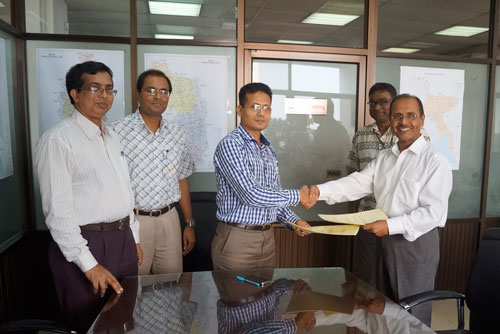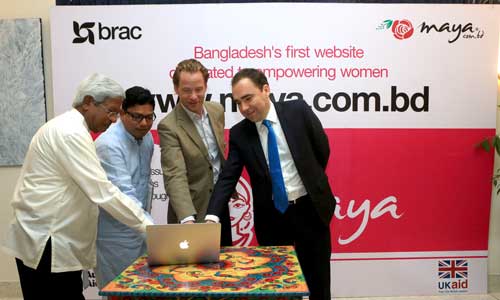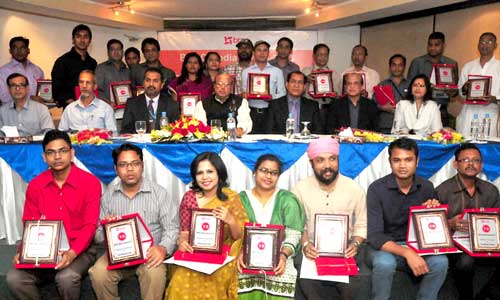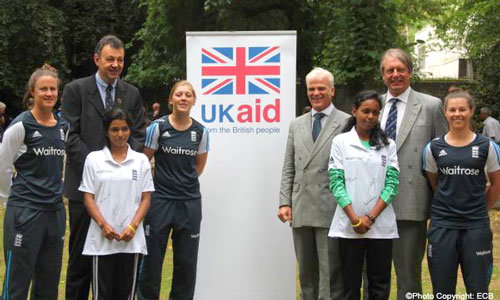
English (965)
Children categories
The English and Information Technology for Adolescents (EITA) project
24 March 2015
Food Safety in Bangladesh: Current Scenario, Challenges and Prospects
7 April 2015
LGED and BRAC launches Community Road Safety Programme

On 18 May 2015, the Local Government Engineering Department (LGED) and BRAC's community road safety programme signed an agreement to pilot a two year long road safety awareness programme in the upazillas of Teknaf and Ukhyia in Cox's Bazar and Sreepur and Kapashia in Gazipur. This endeavour is a component of LGED's Second Rural Transport Improvement Project (RTIP-II) which is funded by the World Bank.
As per the World Health Organization, 18,000 Bangladeshis lose their lives every year due to road crashes costing the country around USD 1,000 million in losses. Of that number, children (under 15) fatality accounts for 11 per cent. Road crashes directly affect the poor as they are pushed into poverty, which ultimately hinders the country's development.
In this background, BRAC with support from LGED will implement the Community Road Safety Program which is a bottom up approach to reducing road crashes and casualties. The programme will target community residents comprising of students, teachers, hawkers, shopkeepers and drivers of non-motorised and motorised vehicles. The interventions will hinge on a participatory and holistic approach towards the involved communities. It is designed so as to expand their understanding of safe use of roads, identify road safety problems in their communities, formulating an action plan for solutions and implement it.
During the first 18 months (Phase I), BRAC will distribute various communication materials amongst the residents of the communities (students, teachers and general public), strengthen capacities of LGED community staff, Local Government Institutions and local NGOs, instill vigilance in drivers for improved awareness in accident-prone zones (areas with concentration of pedestrian activities). Phase II of the project will be enacted after a successful completion of the first that will also last for 18 months.
BRAC-Maya launched enhanced website and mobile app

BRAC-Maya partnership launched their enhanced website and mobile app today at an official ceremony in Dhaka. maya.com.bd is the first website of its kind in Bangladesh with an aim to connect women with the information they are looking for, when they are looking for it.
With the support of Australian government’s Department of Foreign Affairs and Trade (DFAT) and UK Aid from the British Government, BRAC embarked on its collaborative work with Maya. BRAC-Maya partnership showcases a unique public-private initiative, working with the common goal of women's empowerment and gender justice. The Australian High Commissioner His Excellency Mr Greg Wilcock hosted the launching ceremony at his Gulshan residence alongside BRAC’s other strategic partner, the UK.
At the event, BRAC-Maya presented two of its products - the newly revamped BRAC-Maya site with localised content on women's workplace environment, health, legal and social issues and mobile platform based question-answer app, ‘Maya Apa’, the first of its kind in Bangladesh.
At the launching ceremony Australian High Commissioner His Excellency Greg Wilcock said, “Australia is a strong supporter of innovative ways of addressing poverty and empowering poor men and women. We are very proud to be associated with the Maya app, and the potential it has to help women and girls make more informed choices on health, legal and psychosocial issues”.
Sheepa Hafiza, Director, BRAC Gender Justice and Diversity said,“We expect this ground breaking project will bring rapid changes in bridging digital divide in Bangladesh between classes, locality and sex. By leveraging the power of information through web and the app , it will help women to take their own decision about the issues which are mostly untold and hidden like an ice berg, but extremely important for survival and to be powerful.”
Ivy H Russell, founder of Maya, added, “We are excited to launch the revamped maya.com.bd website which has more user friendly features and most importantly, fully integrated with our Maya Apa app. We are motivated to continue innovating with the Maya Apa app. Our mission is to connect women to the knowledge they are looking for through easily available technology when they are looking for it. Our website and app aim to bridge the digital divide by providing information to women and empowering women of all walks of life in Bangladesh. May Apa app is available on Google Play Store for immediate download and usage”.
Training on Human Rights and Migrant Workers

Migration Programme, BRAC started two national human rights and migrant workers training for the government officials specially the District Employment and Manpower Officials on 15 -16 April 2015 and on 19 - 20 April 2015 at the conference room of BRAC Centre Inn, Dhaka. The training participants are the representatives from concerned ministries and district employment and manpower officials.
The training is covering the Universal Declaration of Human Rights (UDHR), UN Convention 1990 on the Protection of the Rights of All Migrant Workers and Members of Their Families, Constitution of Bangladesh, Overseas Employment and Migrants Act 2013, gender and other important national and international instruments for protecting migrants' rights. We believe the training will help the government officials to protect the migrants' rights at the district level.
In 2011, Government of Bangladesh has ratified International Convention on the Protection of the Rights of All Migrant Workers and Members of Their Families and in 2013, Bangladesh also enacted Overseas Employment and Migrants Act 2013.
Mr Khandaker Md Iftekhar Haider, Secretary, Ministry of Expatriates’ Welfare and Overseas Employment will present as the Chief Guest, Begum Shamsun Nahar, Director General, Bureau of Manpower, Employment and Training will present as a chair. Ms Sheepa Hafiza, Gender Justice and Diversity and Migration Programme will moderate the closing ceremony on 20 April 2015.
BRAC Recognises media efforts to report on TB

Tuberculosis (TB) is one of the major public health problems in Bangladesh and its neighbouring countries for decades. According to the World Health Organization (WHO), Bangladesh ranks seventh among the 22 highest TB-burdened countries. Government, Donor Agencies and NGOs came forward to combat the control of TB.
BRAC considered tuberculosis control work as early as 1984 and in 1994 BRAC became the first NGO in the country to sign a MOU with the government of Bangladesh to expand directly observed treatment short course (DOTS) services across the country.
BRAC also became a principle recipient (PR) of the Global Fund to Fight AIDS, Tuberculosis and Malaria (GFATM), along with the government. The aim of the programme is to reduce the morbidity, mortality and transmission of TB to eliminate its presence as a public health problem.
According to The Bangladesh Today, ‘In 2014 one lakh 91 thousand and 155 patients have been diagnosed with tuberculosis under the National TB Control Programme in the country. In 2013 the success rate of TB treatment was 94 per cent in Bangladesh.’
In 2014, a number of 43 organisations showed solidarity, 792 news on newspapers and 83 articles on TB has been observed. The role of media is undoubtedly imperative to create awareness about tuberculosis in mass people. In Bangladesh media is definitely leaving remarkable contribution to promote understanding of TB side by side of Government of Bangladesh, NGOs and other stakeholders.
On 24 March 2015, three national media houses and 23 journalists from national and local newspapers have been honoured with BRAC Media Award 2015 for their special reports on tuberculosis issues. The prime news contributors received the award from the honourable minister of the ministry of health and family welfare on World TB Day at BRAC Centre Auditorium. The event was chaired By Dr Ahmed Mushtaque Raza Chowdhury, vice-chairperson and interim executive director of BRAC and chief guests was Mr. Mohammad Nasim, MP, Honourable Minister of Health and Family Welfare; special guests were, Dr. Md. Ahmed Hussain Khan, Director, MBDC & TB-Leprosy; NTP, Dr. Navaratnasamy Paranietharan, Country Representative, WHO and Prof. Dr. Deen Muhammad Nurul Haque, Director General of Health Services, Ministry of Health and Family Welfare.
The BRAC Media Award has been organised for the 5th time since 2008. This year a three-member jury gave its judgment after a scrutiny of the reports submitted. Senior journalist Md Farid Hossain, former bureau chief of AP, chaired the jury with Shahnaz Munni, news editor, ATN Bangla, and Dr Asif Muztaba Mahmud, associate professor, respiratory medicine, IEDCR as the other members. Dr Mahmud acted as the technical expert for the jury.
The awards were given based on three main categories: print, electronic and online media reporting. The print media reports which are most in number were again divided into eight categories of seven divisions and national level in Bangladesh.
The Daily Ittefaq, The Daily Observer and NTV (International Television Channel Ltd), have been awarded the prize this year in recognition of their involvement in increasing awareness about tuberculosis.
During the award giving ceremony, the awarded journalists/reporters overwhelmingly reflected on their experience of covering TB in the media. How social taboo often acts as a barrier to case identification, threat in increasing number of multiple drug resistance cases, need for more investigative reports, importance of spreading the preventive activities outside the capital city, TB is not a disease for the poor but all, and many more thoughts were shared by the present journalists and reporters.
Entrepreneur from BRAC Pakistan receives award
BRAC Pakistan’s entrepreneur Abida Perveen and her loan officer Nasreen Akhtar from Multan received the award for ‘Most Innovative MFI’ during the ninth Citi-PPAF Micro-entrepreneurship Awards 2014 held at Serena Hotel, Islamabad on 31 March 2015. Abida Perveen and Nasreen Akhtar also received USD 1,165 (PKR 120,000) as cash prize along with the award.
Jointly organised by Citi Foundation, a philanthropic arm of Citibank, and Pakistan Poverty Alleviation Fund (PPAF), the awards aim to recognise best practices, entrepreneurial skills, and leadership qualities of individual micro-entrepreneurs in Pakistan.
Italian Ambassador in Pakistan, Mr Adriano Chiodi Cianfarani and federal minister for planning and development, Mr Ahsan Iqbal were the chief guests of the ceremony and they presented the awards to the winners for their extraordinary contributions to economic sustainability of their families as well as their communities.
The Pakistan Micro-finance Network (PMN) short listed potential award winners from 280 applicants from different organisations across Pakistan. The short listed applicants underwent a rigorous assessment process that studied both their business models and the impact they had on their communities. The panel of judges consisted of experts from IlM Ideas, World Bank Group, Bahria University, ILO, UNDP, Engro Foundation and NH Consultancy (Pvt) Ltd.
BRAC announces USD 1.5 million contribution to Nepal

BRAC, the international NGO based in Bangladesh, announces contribution of USD 1 million from its fund to Nepal earthquake victims. In addition to this, BRAC Bangladesh, BRAC Bank and BRAC University staff will contribute their one-day basic salary, which is USD 300,000 in total. BRAC Social Enterprises will also contribute another USD 200,000, totalling BRAC’s contribution to Nepal to USD 1.5 million. Moreover, BRAC already took initiative to mobilise USD 15 million from international donors. BRAC International and BRAC’s affiliates in UK and USA will raise these additional funds.
BRAC will start its support activities in one of the most affected areas of Nepal, Nuwakot. Explaining the initiative, senior director of strategy, communications and empowerment of BRAC and BRAC International, Asif Saleh said, “From the very beginning, BRAC has been dedicated to improving the lives of people. We believe it is BRAC’s mandate to come in and aid our neighbouring country, as it faces a major humanitarian crisis. BRAC has years of experience in emergency disaster response. We successfully carried out operations in Haiti, after the devastating earthquake in 2010, Sri Lanka, and in Indonesia after the deadly tsunami in 2004”.
The two yearlong support programme in Nuwakot includes household support for 2,000 household, rehabilitation of 200 maimed earthquake victims (both short-term and long-term), psychosocial rehabilitation of 30,000 earthquake victims, and livelihood support for 5,000 households.
BRAC International already contributed USD 50,000 from its fund to the earthquake-stricken nation. An emergency medical team from BRAC has been sent to Nepal to provide medical treatment, essential medicine and dry food to earthquake victims. This team is working in Dolekha, Bhaktapur, Sindupalchawk, Lalitpur, and Kathmandu in collaboration with the Nepalese government.
Standing tall

Photo Credit: Quamrul Abedin
A Dhaka Tribune article by Farhana Urmee
Where does happiness come from? Day labourers live hand to mouth, but I met one of them who felt empowered by earning for her family.
Women are coming out of their homes in droves - from all ages, from all classes, educated or uneducated, from urban or village homes. Of course, we have a long list of problems in our patriarchal society, and women still face discrimination.
Yet, engaging in work that is paid can bring her esteem and empowerment, and gives her the freedom from being enslaved by the traditional role for women. Work is her liberty.
Driving, Miss Khatun
Aklima Khatun is an unsual sight on Dhaka streets: a female chauffer.
She is also the ever-smiling woman. She smiles when she steers the wheel. She smiles because of the power she has gained through her work. Her smile conveys her happiness at having a job, after having been an impoverished divorcee and single mother at the age of 20.
“My life has changed after I found this work.”
Regarding people’s response to seeing her behind the wheel, Aklima says: “I clearly see appreciation in the eyes of female passers-by. The men do stare at me sceptically, with distrust or disregard, but that look makes me feel that yes, I am doing something that has not really been done, and I feel uplifted.”
How did she come to choose this unusual line of work, rather than working in the RMG sector like so many other young women in her position?
Luck and an enterprising spirit.
After her divorce, Aklima went to live with her sister in Goforgaon, Mymensingh. She was helpless, scared, and felt like a burden to her family. As an uneducated and unskilled women, she did not have the courage to come to Dhaka all alone to try to find a job.
Her sister happened to live next door to a Brac-funded school, which found her and began to offer her skills training and counselling. They helped her move to Dhaka, where she took a five-month training course at their driving school. It took two tries to get her driver’s license, but she stuck with it. And she passed the exam, they helped get her a job.
She now works for another working woman in the city, who wants to help women like her become self reliant.
Aklima feels fortunate to have had Brac’s support. Where once she couldn’t even talk to strangers, she is now a self-assured woman, who holds her car keys in her hand all the time, as if in a perpetual state of readiness to drive.
She takes pride in taking on a job that is mostly done by men.
“During the training programme, one day I drove to my home village in a training car. From their faces I could see that I was setting an example for other girls in my village, whereas before I had been living as a poor abandoned wife,” she beams.
A healthy mission
Gulshan Ara, another tough but smiling woman, has 10 years experience in her field. She works as a health visitor and service promoter for Surjer Hashi Chinhito Clinic in Dhaka.
Health visitors travel from place to place to convey healthcare information such as on birth control, prenatal care, child vaccinations. They also counsel people to encourage healthy behavioural changes.
“As a child, I always dreamed of becoming a doctor, but I could not make it. Still, I made my dream come true by serving people in a different way. I hope to raise my daughter with a good education, and perhaps she can become doctor one day,” Gulshan says.
She smiles because it helps her with the uphill job of motivating people who are mostly illiterate with a number of health problems, asking them to adopt new habits. She has to be friendly even in the face of their negative reactions, and display on understanding of their apprehensions.
The work is not without challenges.
“I really feel good about my job, even though it comes with a number of physical hazards that I have to cope with.” says Gulshan, who walks in sun and rain, trudging through muddy roads in bare feet to get to her destination. She often needs to deal with local goons to enter certain localities.
“I see people are listening to me and trusting me simply because I am female,” Gulshan says, since it allows her access to people’s homes despite being a stranger.
“I know some women face problems at their work, but in some professions, it helps being a woman.”
Constructing her own reality
Construction worker Johura’s weather beaten face does not fail to smile while speaking about her job. She did not seem to feel like a victim, but rather takes pleasure at the sight of her children playing nearby while she works.
I found Johura at a construction site in Bashundhara neighbourhood, loading construction materials into a cane basket and carrying them to the other site workers. She also breaks bricks.
She and her husband eat together. He is also a construction worker, often at the same site, so they take their breaks together. She had surprisingly few complaints about difficulties at her workplace, other than occasional disagreements on late wage payments with the contractor.
Regarding eve-teasing, Johura says: “Just let someone come here to harass us. All the women working here at the site will teach him a lesson.”
She hopes to give her three children an education, and continue her work as long she is physically capable. At the end of the day when she gets her wage; she goes back to her abode with a smile.
Her just desserts
Sheema Akter is a 21-year-old university student who sells ice cream at Bashundhara City.
She took the job to help her father during a family financial crisis by earning her own income. Although the hard times have now passed, Sheema continues to work, in addition to studying at Eden College, where she is majoring in psychology.
Sheema is a pretty girl, and she attracts both negative and positive attention from customers. She says some people buy from her and express support for her, but others make suggestive comments. She just ignores the lewd behaviour. “I simply give them a polite smile and hand them their ice-cream.”
Sheema is proud of her work, which is letting her become financially independent, and fills her with self-esteem.
Women cricketers to make a stand against early forced marriage

A Boxscore News article
England women’s cricketers Heather Knight, Lydia Greenway and Tammy Beaumont met two female Bangladeshi cricketers and International Development Minister, Desmond Swayne at Lord’s today (Monday July 21) to discuss issues around sport, women’s empowerment and early forced marriage, ahead of the Prime Minister’s Girl Summit 2014.
Bangladesh-based charity BRAC has flown in the two young female cricketers, Mitu Roy and Tania Akter, from their Adolescent Development Programme, to take part in the UK’s Girl Summit, which takes place tomorrow (Tuesday July 22). The Summit aims to bring about action to end the practices of child, early & forced marriage (CEFM) and female genital mutilation (FGM) within a generation.
International Development Minister, Desmond Swayne, who was welcomed to Lord’s by Giles Clarke, the ECB Chairman, said: “Sport can make a real difference to the lives of girls in developing countries. It gives them a healthy, enjoyable past time, of course. Even more importantly it helps them to establish themselves in their community, raises their status and gives them control over their future.
“Too often girls around the world are robbed of a choice in life by being forced to marry early. It also puts them at risk of missing an education and dying young in childbirth.
“The UK will host the first Girl Summit, aimed at mobilising domestic and international efforts to end female genital mutilation and child marriage within a generation.”
England women’s cricketer, Heather Knight, added: “Meeting Mitu and Tania today and discussing some of the challenges that they face on a daily basis has been really thought provoking. It is shocking to hear that one in three girls in developing countries is married by the time they are 18, with some of those as young as eight. Charities like BRAC are doing wonderful work to try to address these issues, and I hope that the UK’s Girl Summit will generate the world wide support needed to inspire local and national efforts to end early forced marriage.”
BRAC Chairperson, Sir Fazle Ahbed, said: “BRAC ensures that Bangladeshi adolescents are fully equipped to face life and its challenges through its multiple and comprehensive interventions, including sport. Participating in sport empowers adolescents, especially girls. It builds their self-confidence, independence and the ability to take decisions that affect their lives."
Mitu Roy (20) and Tania Akter (21) are club leaders and cricket coaches from BRAC’s Adolescent Development Programme, which aims to help build confidence in adolescents.
Mitu said: “Through playing cricket in BRAC clubs I have gained the trust of my family as well as the community. Now they know that I can lead my team and solve my problems for myself.”
Tania added: “Playing sport has made me so confident that now I can talk freely about many other issues with many people and can encourage other girls to do the same.”
The event at Lord’s today follows a visit by members of the England women’s team to the Acid Survivors Foundation (ASF) in Dhaka during the ICC Women’s World Twenty20 competition in March. At the ASF, the players got the opportunity to see how funding from the UK Department for International Development (DFID) has helped thousands of women and children who have been disfigured in acid attacks.
Notes:
1. The Girl Summit 2014 will be hosted by Secretary of State for International Development Justine Greening and Home Secretary Theresa May, alongside heads of state, domestic and international practitioners, survivors, charities, community groups and celebrities.
2. The Summit will aim to secure new commitments from the private sector, faith leaders, other civil society organisations and governments.
3. According to the Department for International Development, in developing countries, around 11 per cent of women are entered into marriage or union before they reach the age of 15, and nearly half of young women in South Asia are married by their 18th birthday. In countries like Bangladesh, sport is one way for young women to take control over their future and raise their status in society.
4. BRAC, based in Bangladesh, is one of the largest development NGOs in the world. Its Adolescent Development Programme (ADP) started in 1993. In order to retain the literacy rate and life skills that many girls lose after primary schooling, BRAC’s Education Programme opened Adolescent Clubs giving girls the chance to socialise, play indoor games, sing, dance and exchange views and experiences – all activities that were frowned upon in their homes.
Join the world’s biggest family




